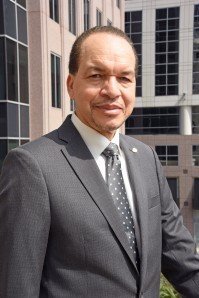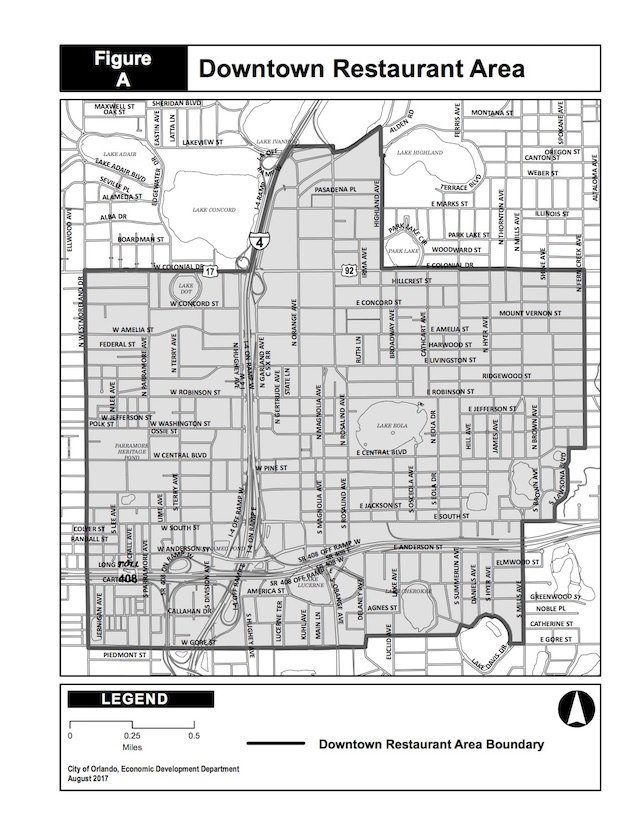
The City of Orlando will petition the state legislature to enact a special exemption for smaller restaurants to sell full liquor within a newly designated Downtown Restaurant Area.
According to city officials, the exemption is designed to encourage independent restaurateurs and chef-owners to establish new businesses in downtown Orlando and to give them the means to compete alongside the many standalone bars that dominate the downtown scene.
Currently, in order for a restaurant to get a license to serve full liquor, it must have the capacity to serve at least 150 customers at one time and it must occupy a space of at least 2,500 square feet. It must also derive at least 51 percent of its sales from food service.
The city is asking for legislation to reduce those thresholds to 80 customers in an area of at least 1,800 square feet. The minimum food sales figure would remain the same.
Although there is currently an officially designated downtown redevelopment district, the Downtown Restaurant Area will expand beyond those borders slightly. Essentially, the area will run from Gore Street south of downtown; Colonial Drive to the north (with a partial bulge extending to Lake Ivanhoe between Interstate-4 and Highland Avenue); Westmoreland Drive on the west; and Ferncreek Avenue on the east. (The proposed map is below.)
The need for the exemption arose from a focus group comprised of restaurateurs and other foodservice professionals that was formed as part of Project Downtown Orlando (DTO). (Full disclosure: I chaired the restaurant stakeholder group.)
Among the frustrations outlined by the group were liquor licenses. It is not impossible for a smaller restaurant to obtain a full liquor license, known as a 4COP (the initials stand for “consume on premises”), but the cost for a 4COP, which are limited in number under a quota system, can exceed $300,000.
A 2COP license, which allows for the sale of beer and wine only, is easily obtained and much less costly.
Restaurants that meet the benchmarks for the number of patrons served and the size of the facility can obtain a license known as SFS, for Special Food Service (previously known as SRX). The city’s request will ask for an exemption for smaller businesses within the Downtown Restaurant Area to obtain an SFS license.
 “We’re always looking to enhance the allure of downtown Orlando,” said Thomas C. Chatmon, Jr., executive director, Downtown Development Board/Community Redevelopment Agency. “That is, to have more amenities for a broader range of people.” Chatmon said that when he asked chefs and restaurateurs why they weren’t investing in downtown Orlando, they told him there were barriers.
“We’re always looking to enhance the allure of downtown Orlando,” said Thomas C. Chatmon, Jr., executive director, Downtown Development Board/Community Redevelopment Agency. “That is, to have more amenities for a broader range of people.” Chatmon said that when he asked chefs and restaurateurs why they weren’t investing in downtown Orlando, they told him there were barriers.
Among them are the limitations of the buildings themselves. Many have historical designations that make it difficult to find a suitable location that can meet the 2,500 square feet minimum. And downtown being downtown, rental rates can be twice what they are in other parts of the city.
There is also the scale. A restaurant that seats at least 150 people is more difficult and costlier to operate, making it unattractive to chefs wishing to offer a more intimate dining experience. And as chefs know, many customers make a decision on where to dine based on whether they can have a cocktail with dinner.
Chatmon, pictured at left, said that he also asked residents what they feel is missing in downtown Orlando. “It came out that people would love to have what I call more boutique dining experiences, perhaps from a chef you know or have read about, and to have a cocktail or two.”
With the Dr. Phillips Performing Arts Center, Amway Center, two stadiums and the coming Creative Village and UCF Downtown Campus, the demand for such boutique restaurants will rise.
The city will present its petition to the local delegation of state legislators, headed by Sen. Jose Torres, on Monday, Oct. 16. If the delegation gives its approval for the bill — it must be sponsored by a local representative — it will go to Tallahassee for a vote.
The request is not without precedence. Approximately 20 other Florida municipalities have been granted the exemption.












